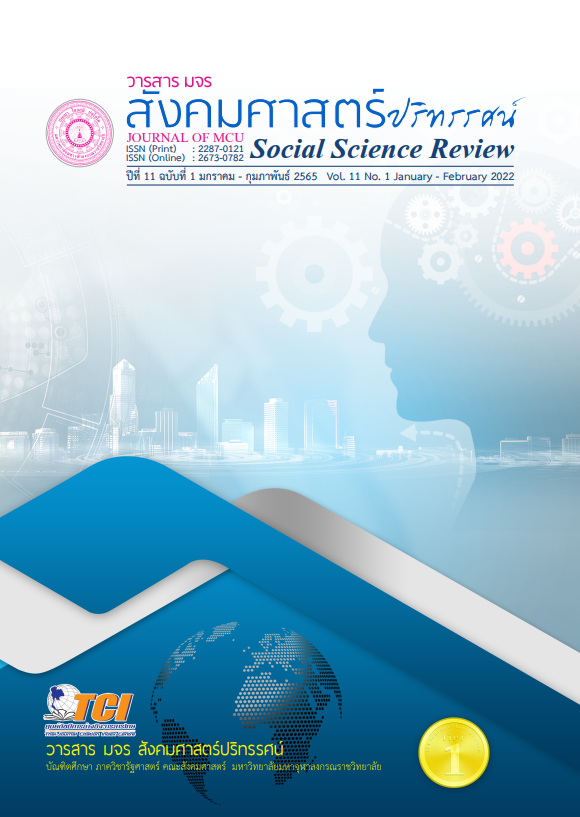คุณธรรมจริยธรรมของผู้บริหารสถานศึกษา สังกัดกรุงเทพมหานคร
คำสำคัญ:
คุณลักษณะ, คุณธรรมจริยธรรม, ผู้บริหารสถานศึกษาบทคัดย่อ
บทความวิจัยนี้มีวัตถุประสงค์ เพื่อศึกษาลักษณะ องค์ประกอบ ส่งเสริมคุณลักษณะด้านคุณธรรมจริยธรรมของผู้บริหารสถานศึกษา สังกัดกรุงเทพมหานคร เป็นการวิจัยแบบผสานวิธี คือ วิธีวิจัยเชิงคุณภาพและเชิงปริมาณ กลุ่มตัวอย่างได้แก่ ผู้บริหารสถานศึกษา จำนวน 536 คน เครื่องมือที่ใช้คือแบบสัมภาษณ์ ชนิดมีโครงสร้าง แบบสอบถามระดับคุณธรรมจริยธรรม สัมภาษณ์ผู้ทรงคุณวุฒิ สถิติที่ใช้วิเคราะห์ข้อมูล ค่าความถี่ ค่าร้อยละ ค่าเบี่ยงเบนมาตรฐาน วิเคราะห์องค์ประกอบเชิงสำรวจ และการวิเคราะห์เนื้อหา
ผลการวิจัยพบว่า 1. คุณลักษณะคุณธรรมจริยธรรม มี 4 คุณลักษณะ คือ 1) คุณลักษณะต่อตนเอง 2) ต่อสังคม 3) ต่อเพื่อนร่วมงาน และ 4) ต่อองค์การ 2. องค์ประกอบคุณลักษณะที่ 1) คุณธรรมจริยธรรมต่อตนเอง 12 ตัวแปร ด้านที่ 2) คุณธรรมจริยธรรมต่อสังคม 4 ตัวแปร ด้านที่ 3) คุณธรรมจริยธรรมต่อเพื่อนร่วมงาน 10 ตัวแปร ด้านที่ 4) คุณธรรมจริยธรรมต่อองค์การ 5 ตัวแปร เมื่อทำการวิเคราะห์ข้อมูลเชิงประจักษ์ พบว่า ทุกองค์ประกอบมีความสัมพันธ์และความสอดคล้องของโมเดลกับข้อมูลเชิงประจักษ์ มีนัยสำคัญทางสถิติ 0.01 3. แนวทางการส่งเสริมคุณลักษณะด้านคุณธรรมจริยธรรมของผู้บริหารสถานศึกษา ประกอบด้วย ดังนี้ 1) ด้านตนเอง กำหนดให้มีการจัดอบรมคุณธรรมจริยธรรม 2) ด้านสังคม ฝึกการมีส่วนร่วมในองค์การ 3) ด้านเพื่อนร่วมงาน ส่งเสริมให้ร่วมกันคิดร่วมพัฒนา 4) ด้านองค์การ ยึดหลักกัลยาณธรรมช่วยเหลือเกื้อกูลผู้อื่น
เอกสารอ้างอิง
กรมวิชาการ กระทรวงศึกษาธิการ. (2524). คู่มือการศึกษาจริยธรรมระดับอุดมศึกษา ตอนที่ 2. กรุงเทพฯ: โรงพิมพ์การศาสนา.
ดวงเดือน พันธุนาวิน. (2538). คู่มือ : การพัฒนาและส่งเสริมการปฏิบัติตามมาตรฐานทางจริยธรรมข้าราชการพลเรือนสำหรับคณะกรรมการจริยธรรม. กรุงเทพฯ: สำนักงานข้าราชการพลเรือน.
ธนิษฏ์ชัย นาคะสุวรรณ. (2543). จริยธรรมองค์กร: แนวคิดรูปแบบการส่งเสริมจริยธรรมองค์กรในแนวพฤติกรรมศาสตร์. กรุงเทพฯ: มูลนิธิซิเมนต์ไทย.
วศิน อินทสระ. (2541). พุทธจริยศาสตร์. กรุงเทพฯ: ทองกวาว.
วิริยา ชินวรรโณ. (2546). จริยะธรรมในอาชีพ. กรุงเทพฯ: โรงพิมพ์ชวนพิมพ์.
สาโรช บัวศรี. (2544). การศึกษา ปรัชญาการศึกษาประชาธิปไตย และจริยธรรม. กรุงเทพฯ: สุวีริยาสาส์น.
สิริกุล อนุรักษ์ธนากร. (2563). รูปแบบการบริหารการศึกษาของผู้บริหารโรงเรียนวิถีพุทธ สังกัดสำนักการศึกษา กรุงเทพมหานคร. วารสาร มจร สังคมปริทรรศน์, 9(2), 114-128.
สุวิมล ติรกานันท์. (2545). การประเมินผู้บริหารสถานศึกษาด้านคุณธรรม จริยธรรมและการเป็นแบบอย่างที่ดี. วารสารสถาบันพัฒนาผู้บริหารการศึกษา, 19(4).
อนันตชัย พงศ์สุวรรณ. (2547). การบริหารการศึกษาในคลื่อนความเปลี่ยนแปลง. บุรีรัมย์: โรงพิมพ์วินัย.
อานันท์ ปันยารชุน. (2542). มุมมองนายอานันท์. กรุงเทพมหานคร: สำนักมติชน.
อำพล สายสิริเวชกุล. (2550). ความสัมพันธ์ระหว่างการรับรู้ความกดดันทางจริยธรรม ความเชื่อทางศีลธรรม และความผูกพันต่อองค์การของพนักงานระดับปฏิบัติการธนาคารพาณิชย์ต่างชาติแห่งหนึ่ง. กรุงเทพฯ: มหาวิทยาลัยธรรมศาสตร์.
Frank, J. N. (2021). Ethics Audits : You Get What You Pay For. Retrieved September 12, 2021, from http://www.ethic.org/resources/articals-oganizationalethics. Asp? aid=892
ดาวน์โหลด
เผยแพร่แล้ว
รูปแบบการอ้างอิง
ฉบับ
ประเภทบทความ
สัญญาอนุญาต
ลิขสิทธิ์ (c) 2022 วารสาร มจร สังคมศาสตร์ปริทรรศน์

อนุญาตภายใต้เงื่อนไข Creative Commons Attribution-NonCommercial-NoDerivatives 4.0 International License.
เพื่อให้เป็นไปตามกฎหมายลิขสิทธิ์ ผู้นิพนธ์ทุกท่านต้องลงลายมือชื่อในแบบฟอร์มใบมอบลิขสิทธิ์บทความให้แก่วารสารฯ พร้อมกับบทความต้นฉบับที่ได้แก้ไขครั้งสุดท้าย นอกจากนี้ ผู้นิพนธ์ทุกท่านต้องยืนยันว่าบทความต้นฉบับที่ส่งมาตีพิมพ์นั้น ได้ส่งมาตีพิมพ์เฉพาะในวารสาร มจร สังคมศาสตร์ปริทรรศน์ เพียงแห่งเดียวเท่านั้น หากมีการใช้ภาพหรือตารางหรือเนื้อหาอื่นๆ ของผู้นิพนธ์อื่นที่ปรากฏในสิ่งตีพิมพ์อื่นมาแล้ว ผู้นิพนธ์ต้องขออนุญาตเจ้าของลิขสิทธิ์ก่อน พร้อมทั้งแสดงหนังสือที่ได้รับการยินยอมต่อบรรณาธิการ ก่อนที่บทความจะได้รับการตีพิมพ์ หากไม่เป็นไปตามข้อกำหนดเบื้องต้น ทางวารสารจะถอดบทความของท่านออกโดยไม่มีข้อยกเว้นใดๆ ทั้งสิ้น





